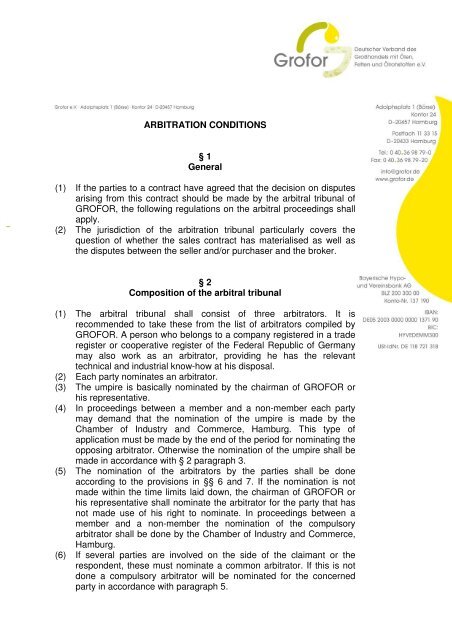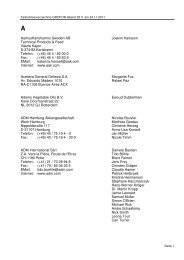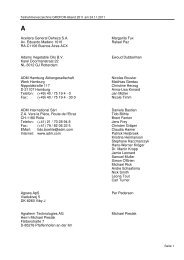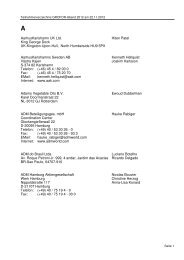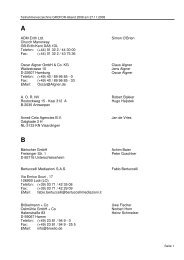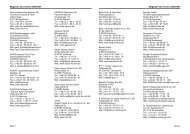Arbitration Rules - Grofor
Arbitration Rules - Grofor
Arbitration Rules - Grofor
You also want an ePaper? Increase the reach of your titles
YUMPU automatically turns print PDFs into web optimized ePapers that Google loves.
@@SERIENFAX@@<br />
ARBITRATION CONDITIONS<br />
§ 1<br />
General<br />
(1) If the parties to a contract have agreed that the decision on disputes<br />
arising from this contract should be made by the arbitral tribunal of<br />
GROFOR, the following regulations on the arbitral proceedings shall<br />
apply.<br />
(2) The jurisdiction of the arbitration tribunal particularly covers the<br />
question of whether the sales contract has materialised as well as<br />
the disputes between the seller and/or purchaser and the broker.<br />
§ 2<br />
Composition of the arbitral tribunal<br />
(1) The arbitral tribunal shall consist of three arbitrators. It is<br />
recommended to take these from the list of arbitrators compiled by<br />
GROFOR. A person who belongs to a company registered in a trade<br />
register or cooperative register of the Federal Republic of Germany<br />
may also work as an arbitrator, providing he has the relevant<br />
technical and industrial know-how at his disposal.<br />
(2) Each party nominates an arbitrator.<br />
(3) The umpire is basically nominated by the chairman of GROFOR or<br />
his representative.<br />
(4) In proceedings between a member and a non-member each party<br />
may demand that the nomination of the umpire is made by the<br />
Chamber of Industry and Commerce, Hamburg. This type of<br />
application must be made by the end of the period for nominating the<br />
opposing arbitrator. Otherwise the nomination of the umpire shall be<br />
made in accordance with § 2 paragraph 3.<br />
(5) The nomination of the arbitrators by the parties shall be done<br />
according to the provisions in §§ 6 and 7. If the nomination is not<br />
made within the time limits laid down, the chairman of GROFOR or<br />
his representative shall nominate the arbitrator for the party that has<br />
not made use of his right to nominate. In proceedings between a<br />
member and a non-member the nomination of the compulsory<br />
arbitrator shall be done by the Chamber of Industry and Commerce,<br />
Hamburg.<br />
(6) If several parties are involved on the side of the claimant or the<br />
respondent, these must nominate a common arbitrator. If this is not<br />
done a compulsory arbitrator will be nominated for the concerned<br />
party in accordance with paragraph 5.
(7) A delayed nomination of the arbitrator by the defaulting party can still<br />
be considered by the chairman of GROFOR or his representative<br />
until the arbitrator is nominated.<br />
§ 3<br />
Withdrawal of arbitrators<br />
If an arbitrator is prevented for attending, is unavailable or refuses to<br />
perform his position as arbitrator for any reason, the person who<br />
nominated him is obliged to nominate a replacement arbitrator. If the<br />
nomination of the replacement arbitrator to be nominated by a party does<br />
not take place within 3 business days after the request has been delivered<br />
by the registry, it will be effected in this case by the chairman of GROFOR<br />
or his representative.<br />
§ 4<br />
Rejection of arbitrators<br />
(1) A person proposed for the position of arbitrator must disclose all<br />
circumstances that could raise doubts about his impartiality or<br />
autonomy. An arbitrator is also obliged after being appointed until the<br />
end of the arbitral proceedings to immediately disclose such<br />
circumstances if he hasn’t already done so previously.<br />
(2) An arbitrator may only be rejected if circumstances are given raising<br />
justified doubts about his impartiality or autonomy, or if he does not<br />
fulfil the prerequisites agreed between the parties. A party may only<br />
reject an arbitrator he has appointed or towards whose appointment<br />
he contributed for reasons that had only became known to him after<br />
the appointment. The application is to be made in writing within<br />
2 weeks after the composition of the arbitral tribunal or a<br />
circumstance within the meaning of this paragraph has become<br />
known stating the reasons for the rejection.<br />
(3) Initially the arbitral tribunal shall decide on the rejection of one or<br />
several arbitrators with the elimination of the rejected arbitrators and<br />
with the addition of the relevant number of replacement arbitrators to<br />
be determined by the chairman of GROFOR or his representative. If<br />
the entire arbitral tribunal is rejected, the chairman of GROFOR or<br />
his representative shall nominate three replacement arbitrators to<br />
decide on the rejection. The replacement arbitrators carry out their<br />
duties free of charge. The parties retain the right to take legal action<br />
specified in § 1037 paragraph 3 ZPO (Code of Civil Procedure) and<br />
§ 1062 paragraph 1 number 1 ZPO.
§ 5<br />
Correspondence<br />
All written statements of the case with appendices are to be submitted<br />
with five copies to the registry of the arbitral tribunal. A further copy is to<br />
be attached for each further party involved in the dispute.<br />
§ 6<br />
Recourse to the arbitral tribunal<br />
(1) Arbitral proceedings start upon the request for arbitration being filed<br />
to the registry of the arbitral tribunal.<br />
(2) The request for arbitration should include:<br />
1. the exact names of the parties,<br />
2. a statement of the relevant facts with the submittal of the existing<br />
evidence (in particular the contract which is the basis for the<br />
contentious transaction),<br />
3. a defined application relevant to the principal object of the action,<br />
4. the appointment of an arbitrator.<br />
5. if the respondent is a foreigner, the claimant should additionally<br />
submit a certified translation in the respondent’s language.<br />
(3) An arbitral tribunal application submitted to the registry of the arbitral<br />
tribunal for reasons of adhering to the time limit must include the<br />
names of the parties and information on the reason for the dispute.<br />
§ 7<br />
Transmission of the request for arbitration<br />
(1) The registry sends the request for arbitration to the respondent<br />
requesting him to nominate an arbitrator within a time limit it will<br />
determine and to comment on the request for arbitration, providing<br />
this has not yet happened.<br />
(2) The receipt of the declaration by the registry is decisive for observing<br />
the time limit when nominating the arbitrator.<br />
§ 8<br />
Statement of defence<br />
The statement of defence should include:<br />
1. a defined application relevant to the principal object of the action,<br />
2. a justification for the same with the submittal of existing evidence.
§ 9<br />
Course of proceedings<br />
(1) The arbitral tribunal determines the course of proceedings under the<br />
leadership of the chairman as he sees fit, providing no special<br />
provisions have been made in the following.<br />
(2) The arbitral tribunal conducts oral proceedings providing the parties<br />
have not explicitly waived oral proceedings.<br />
(3) Before an award has been rendered the arbitral tribunal has to hear<br />
the parties and to determine the facts on which the dispute is based,<br />
providing the investigation requires this.<br />
(4) The arbitration hearing is not public. The arbitral tribunal can allow<br />
third parties to participate in the hearing with the consent of the<br />
parties.<br />
(5) The language of the proceedings is German.<br />
(6) A legal advisor and/or another lawyer, who has a general aptitude for<br />
magistracy, can be called up at each stage as a consultant during the<br />
execution of the proceedings.<br />
(7) Business days in terms of these arbitration conditions are the<br />
workdays with the exception of Saturdays as well as 24 th and<br />
31 st December.<br />
(8) The registry is entitled to demand an advance payment to secure the<br />
costs of the proceedings.<br />
§ 10<br />
Counterclaim and set-off<br />
(1) The respondent can put forward a counterclaim providing the<br />
arbitration agreement includes this matter in dispute and there is a<br />
connection with the cause of action.<br />
(2) It is permissible to set-off in arbitration proceedings if there is no<br />
contractual exclusion of set-off. This also applies in such cases in<br />
which the counterclaim is not subject to arbitration proceedings.<br />
(3) The arbitral tribunal can abstain from making the decision on the<br />
counterclaim or the claim made for set off if a delay in the<br />
proceedings is expected.<br />
§ 11<br />
Third-party notice<br />
(1) A party that believes he is entitled in case of failing to make a claim<br />
to guarantee or indemnity against a third party or fears a claim made<br />
by a third party, can serve third-party notice up until the end of the<br />
last hearing on which the award is issued.<br />
(2) The third party is entitled to serve third party notice.<br />
(3) Third party notice is served by sending a written statement of the<br />
case explaining the facts and the course of the proceedings up to
now and by attaching each one copy of the exchanged written<br />
statements of the case and evidence as well as a summons to a<br />
scheduled hearing, if need be. The notification is sent either by<br />
means of a registered letter directly giving notice to the registry or<br />
through its intervention.<br />
(4) The third party is entitled but not obliged to join in the dispute. If he<br />
joins in, this intervention has the effect of § 74, paragraph III ZPO in<br />
connection with § 68 ZPO based on the agreement between him and<br />
the third party servicing notice.<br />
§ 12<br />
Simultaneous decision-making<br />
(1) On application in the same proceedings the arbitral tribunal is also<br />
entitled to decide simultaneously on a claim asserted by the<br />
respondent against a third party if the contracts and the other facts<br />
essentially tally and if the arbitral tribunal is also responsible at the<br />
ratio of the respondent to the third party and its composition for all<br />
parties.<br />
(2) The same composition is achieved by the arbitrator informing the<br />
third party and the third party in turn being requested to nominate an<br />
arbitrator while the respondent does not nominate an arbitrator.<br />
(3) It is at the discretion of the arbitral tribunal to grant or reject the<br />
proceedings of the simultaneous decision-making. Granting the<br />
rejection is not contestable.<br />
(4) If the arbitral tribunal rejects the execution of the simultaneous<br />
decision-making, the proceedings have to be separated and both<br />
proceedings are to decide on separately in the same composition.<br />
The rejection can also be made by the higher arbitral tribunal.<br />
(5) If several applications for simultaneous decision-making are made in<br />
proceedings, the above regulations shall be correspondingly<br />
applicable.<br />
(6) When lodging an appeal this functions through the chain of parties<br />
involved in the dispute without these in turn having to file an appeal.<br />
§ 13<br />
Deadlines when serving third party notice and simultaneous<br />
decision-making<br />
In the case of third party notice being served resp. simultaneous decisionmaking,<br />
the third party is obliged to give up his arbitrator within a period to<br />
be set by the registry.
§ 14<br />
Summons<br />
(1) The registry sets the dates in agreement with the umpire and makes<br />
the necessary dispositions in this respect.<br />
(2) The summons is done in writing by the registry. An appropriate notice<br />
of the summons is to be taken into account that must be at least<br />
2 weeks.<br />
(3) In the case of international summonses the registry must take into<br />
account the mailing route.<br />
(4) The registry is entitled to set a period for the claimant to justify his<br />
complaint and/or to pay the advance on costs. In the case of failure<br />
to observe this time limit, the complaint shall be valid as having been<br />
withdrawn.<br />
(5) All written statements of the case, documents and other notifications<br />
are to be informed to the other party by the registry.<br />
§ 15<br />
Representation<br />
(1) The parties can have themselves represented in front of the arbitral<br />
tribunal by representatives or counsels if these are employees of the<br />
party or lawyers. The arbitral tribunal can allow for exceptions to the<br />
aforementioned restrictions.<br />
(2) If the party has himself represented at the hearing by a lawyer<br />
without having informed the opposing party of this at least six<br />
business days before the hearing, the arbitral tribunal may adjourn<br />
the hearing date upon the application of the other party.<br />
(3) The costs for a representation must be borne by the party himself<br />
with the exception of costs arising through a necessary<br />
representation in front of the court of law to effect a judicial action<br />
ordered by the arbitral tribunal.<br />
§ 16<br />
Hearing the parties, experts<br />
(1) The arbitral tribunal can order that the parties appear personally and<br />
question them not under oath.<br />
(2) The arbitral tribunal can question witnesses and experts not under<br />
oath appearing voluntarily in front of it. Possible travel and/or lodging<br />
costs shall be borne by the party who arranged for the witnesses.<br />
(3) The arbitral tribunal or a party with the consent of the arbitral tribunal<br />
can apply for support at court for the hearing of evidence or<br />
performing such judicial actions for which the arbitral tribunal is not<br />
authorised. The court completes the application providing it does not<br />
consider it to be impermissible, according to the procedural<br />
regulations valid for the hearing of evidence or other judicial actions.
The arbitrators are entitled to take part in a judicial hearing of<br />
evidence and to ask questions.<br />
§ 17<br />
Rejection of the decision<br />
(1) The arbitral tribunal is entitled at any time to reject a substantive<br />
decision without stating reasons in the form of decision-making.<br />
In this case the arbitration agreement is used.<br />
(2) In a case of a rejection the arbitral tribunal decides on the<br />
apportionment of the costs accrued up to then at its discretion.<br />
§ 18<br />
Decision on the jurisdiction<br />
(1) The arbitral tribunal can decide on its own jurisdiction and in this<br />
context on the existence or validity of the arbitration agreement. An<br />
arbitration clause is hereby to be treated as an agreement<br />
independent of the remaining contractual provisions.<br />
(2) The claim of a lack of jurisdiction of the arbitral tribunal is to be<br />
presented at the latest when the defence is filed. A party is not<br />
excluded from making such a claim due to it having nominated an<br />
arbitrator or cooperated in nominating an arbitrator. The claim that<br />
the arbitral tribunal is exceeding its powers is to be made as soon as<br />
the matter, of which this is maintained, is discussed in arbitration<br />
proceedings. The arbitral tribunal may allow for a later claim in both<br />
cases if the party sufficiently excuses the delay.<br />
(3) If the arbitral tribunal considers itself to be responsible, it shall<br />
generally decide on a claim according to paragraph 2 by means of an<br />
interim decision. In this case each party can apply for a judicial<br />
decision within one month after written notification of the decision.<br />
While such an application is pending the arbitral tribunal may<br />
continue the arbitration proceedings and issue an award. The same<br />
procedure is to be followed if the higher arbitral tribunal approves the<br />
jurisdiction in the case of paragraph 4 against a claim by the<br />
respondent.<br />
(4) If the arbitral tribunal considers itself to be not responsible, it shall<br />
decide on this through an award. The decision is contestable upon<br />
an appeal.
§ 19<br />
Decisions made by arbitral tribunals<br />
(1) The decisions are made with a simple majority of votes.<br />
(2) If an arbitrator refuses to participate in a vote, the remaining<br />
arbitrators can decide without him. The intention to vote on the award<br />
without the refusing arbitrator is to be informed to the parties<br />
beforehand. In the case of other decisions the parties are to be<br />
informed of the refusal to vote retrospectively.<br />
(3) The arbitrators are obliged to preserve the secrecy of the<br />
deliberations.<br />
§ 20<br />
Procedure in the case of non-appearance<br />
The non-appearance of one or both parties to the hearing does not<br />
exempt the arbitral tribunal from the obligation to investigate the facts,<br />
providing this is necessary for the decision; a decision can be made on<br />
the basis of the facts presented to him or that become known to him if the<br />
proof of delivery for the complaint and the summones are available.<br />
§ 21<br />
Arbitral award<br />
(1) The arbitral award must contain:<br />
1. the name of the arbitral tribunal and the arbitrators who<br />
contributed towards the decision,<br />
2. the name of the parties,<br />
3. the decision in the matter and the costs,<br />
4. the reasons for the decision providing the parties have not<br />
explicitly waived this resp. providing this is not an arbitral award<br />
with agreed wording.<br />
(2) All copies of the arbitral award are to be signed by the arbitrators<br />
stating the day and the place of the composition.<br />
The arbitral award is valid as having been issued on this day and at<br />
this place. The signatures of the majority of all members of the<br />
arbitral tribunal are sufficient providing the reason for the missing<br />
signature is stated.<br />
(3) Each party is to be sent an arbitral award signed by the arbitrators.<br />
(4) A correction, interpretation or supplement to the arbitral award is to<br />
be done according to § 1058 ZPO.
§ 22<br />
Settlement<br />
(1) If the parties settle the dispute during the arbitration proceedings, the<br />
arbitral tribunal shall end the proceedings. Upon the application of<br />
the parties it shall record the settlement in the form of an arbitral<br />
award with agreed wording providing the contents of the settlement<br />
do not breach public policy (ordre public).<br />
(2) An arbitral award with agreed wording is to be issued according to<br />
§ 21 of the rules of arbitration and must state that it is an arbitral<br />
award. This type of arbitral award has the same effect as every other<br />
arbitral award regarding the matter.<br />
§ 23<br />
End of the arbitral proceedings<br />
(1) The arbitral proceedings end upon the final arbitral award, or upon a<br />
decision being made by the arbitral tribunal according to paragraph 2<br />
or a certificate being issued by the registry according to paragraph 3.<br />
(2) The arbitral tribunal determines the end of the arbitral proceedings<br />
upon the decision if<br />
1. the claimant<br />
a) has omitted to submit his complaint within the time limit<br />
intended for this and no case of § 1048, paragraph 4 ZPO is<br />
on hand,<br />
b) retracts his complaints, apart from if the respondent<br />
contradicts this and the arbitral tribunal acknowledges a<br />
justified interest of the respondent in the final settlement of the<br />
dispute,<br />
2. the parties agree on the end of the proceedings, or<br />
3. the parties do not further pursue the arbitration proceedings in<br />
spite of being requested to do by the arbitral tribunal or the<br />
continuation of the proceedings has become impossible for<br />
another reason.<br />
(3) If the arbitral tribunal has not yet established itself, the registry shall<br />
issue a certificate in the case of the complaint being retracted<br />
regarding the end of the arbitration proceedings.<br />
§ 24<br />
Continuation of the arbitration agreement<br />
(1) If an arbitral award is cancelled by the court of law for another reason<br />
than that of a lack of jurisdiction of the arbitral tribunal or refused<br />
upon the application for a writ of execution of an arbitral award, the<br />
arbitration agreement is not used in this case.<br />
(2) If the claimant intends to continue to pursue his right, he must submit<br />
a new request for arbitration within one month after the final
adjudication by the court of law. The arbitral tribunal will be newly<br />
formed in this case in accordance with the provisions in section II of<br />
these rules of arbitration, whereby the submission of the first request<br />
for arbitration is decisive for establishing deadlines.<br />
§ 25<br />
Responsibility of the court of law<br />
The responsible court in terms of the 10 th book of the ZPO is the district<br />
court for judicial actions according to § 17 paragraph 3, in all other cases<br />
the Higher Regional Court, in whose district the place of the arbitration<br />
proceedings is located.<br />
§ 26<br />
Publication of arbitral awards<br />
The registry and the legal advisor to the arbitral tribunal are entitled to<br />
publish final arbitral awards in a neutral form.<br />
§ 27<br />
Appeal<br />
(1) The parties are entitled to appellate remedies against the arbitral<br />
award at the higher arbitral tribunal.<br />
(2) The opposing party can still join in the appeal after the expiry of the<br />
period allowed for appeal. If he wishes to make use of this right, this<br />
must be exercised within six business days. This period starts when<br />
the notice of appeal is received after the expiry of the period allowed<br />
for appeal, on the day of receipt, otherwise upon the expiry of the<br />
period allowed for appeal.<br />
§ 28<br />
Time limit and form of the appeal<br />
(1) The appeal is to be lodged within a period of 10 business days after<br />
delivery or receipt of the arbitral award by means of a written<br />
announcement resp. by facsimile by the registry of the arbitral<br />
tribunal. No reasons thereby need to be stated.<br />
(2) The justification for the appeal and the payment of the advance on<br />
costs must be done within an appropriate period set by the registry of<br />
the arbitral tribunal. In the case of missing even one deadline the<br />
appeal is valid as having been retracted. In justified cases the appeal<br />
justification deadline and the deadline to pay the advance on costs<br />
can be extended upon a timely application.
(3) If there is a dispute about the timely lodging of the appeal, its timely<br />
justification or the timely payment of the appeal advance on costs,<br />
the higher arbitral tribunal shall decide on this.<br />
§ 29<br />
Composition of the higher arbitral tribunal<br />
(1) The higher arbitral tribunal shall consist of three arbitrators, of whom<br />
one chairs the arbitral tribunal as umpire.<br />
(2) The arbitrators and the umpire are nominated by the chairman of<br />
GROFOR or his representative taking into account the regulation of<br />
§ 2 paragraph 1. In a procedure between a member and nonmember,<br />
each party can demand that the nomination of the<br />
arbitrators and the umpire is made by the Chamber of Industry and<br />
Commerce Hamburg. This type of application must be made by the<br />
time the period for justifying the appeal has elapsed. Otherwise the<br />
nomination will be done according to sentence 1.<br />
(3) The arbitrators or legal advisors, who contributed in the court of first<br />
instance, may no longer be active as consultants in the court of<br />
second instance.<br />
§ 30<br />
Procedural regulations<br />
The procedural regulations of the court of first instance are valid for the<br />
procedure in front of the higher arbitral court, providing no special<br />
determinations have been made.<br />
§ 31<br />
Certificates on the end of the proceedings<br />
Upon request the registry of the arbitral tribunal shall issue certificates on<br />
the fact that<br />
a) no appeal has been lodged against the arbitral award,<br />
b) only a partial appeal has been lodged resp. to what extent an<br />
appeal has been lodged against an arbitral award,<br />
c) the appeal was not lodged in time and subsequently is<br />
impermissible,<br />
d) the appeal is considered to be withdrawn due to the appeal<br />
justification and/or payment of the advance on costs not being<br />
sent on time,<br />
e) the arbitral award is entirely or partly final.
§ 32<br />
Liability<br />
A liability on the part of the arbitrators, their legal advisers and the<br />
association bodies due to their work in the arbitration proceedings is<br />
excluded to the full extent, providing the legal system permits such an<br />
exclusion.<br />
§ 33<br />
Non-performance of arbitral awards<br />
Upon the application of a party the board of GROFOR is entitled to publish<br />
the name of a company that has not issued a legally valid arbitral award<br />
within a period of one month after transmission. Before the board takes<br />
such measures, the concerned party is to be given the opportunity to<br />
make a statement with an appropriate deadline being set for this; the<br />
outcome of pending enforcement or rescission proceedings proven by the<br />
party at a German court remains to be seen.<br />
§ 34<br />
Fee ordinance of GROFOR<br />
(1) The fees are based on the value of the matter in dispute, which is<br />
determined by the arbitral tribunal.<br />
(2) The following charges will be incurred:<br />
1. as a basic fee with a claim value of up to € 1,000.-<br />
€ 250.- as a minimum rate;<br />
plus from an amount exceeding € 1,000.- up to € 5,000.-<br />
11 % for each hundred or part thereof;<br />
plus from an amount exceeding € 5,000.- up to € 25,000.-<br />
9 % for each hundred or part thereof;<br />
plus from an amount exceeding € 25,000.- up to € 50,000.-<br />
7 % for each hundred or part thereof;<br />
plus from an amount exceeding € 50,000.- up to € 250,000.-<br />
4 % for each hundred or part thereof;<br />
plus from an amount exceeding € 250,000.-<br />
2 % for each hundred<br />
2. Fee for nominating a compulsory arbitrator € 125.-<br />
3. Third party notice each € 125.-<br />
4. Fee for simultaneous decision-making € 175.-<br />
5. For other expenses and costs at least € 200.-<br />
in the court of appeal at least € 300.-<br />
6. Fees for retracting the complaint<br />
a) before the arbitral tribunal is established<br />
standard disbursements € 125.-<br />
b) up to the summons<br />
25 % of the basic fee, at least € 125.-
c) until the hearing commences<br />
50 % of the basic fee, at least € 125.-<br />
d) after the hearing commences<br />
the fee due according to number 1.,<br />
upon retracting the third party notice<br />
and/or the application for simultaneous decision-making<br />
resp. when completing these applications by retracting the<br />
complaint<br />
before the hearing begins € 125.-<br />
standard disbursements, otherwise the full fee.<br />
Along with the basic fees due for payment for b), c) and d) the<br />
standard disbursements and, if need be, the fee for nominating a<br />
compulsory arbitrator will be charged.<br />
7. In cases of suing for payment for the purchase price in arrears,<br />
rejection of a decision by the arbitral tribunal and in the case of<br />
settlements the arbitral tribunal may grant a discount on the basic<br />
fees.<br />
8. In the case of proceedings requiring several hearings or special<br />
time and work expenditure, the arbitral tribunal may increase the<br />
basic fees up to three times the amount.<br />
9. With proceedings in which there is only one request for a decision<br />
to be made on a partial amount or a partial quantity of the total<br />
object of dispute, the arbitral tribunal may increase the basic fees<br />
up to ten times the amount. The same applies to proceedings that<br />
are to serve as a test case to decide other disputes between the<br />
parties or third parties. In both cases the increased fees may not<br />
exceed the amount that would have to be charged if the complete<br />
object had been the matter of dispute.<br />
10. In the court of appeal the basic fees to be calculated according to<br />
numbers 1. and 2. are charged at one and a half times the<br />
amount; the regulations in numbers 5. to 8. are also valid for the<br />
court of appeal.<br />
(3) All arbitral tribunal fees are net prices without VAT.<br />
(4) The three arbitrators shall each receive one fifth of the fees charged<br />
and GROFOR shall receive two fifths.<br />
§ 35<br />
Cost bearing<br />
(1) The entire costs shall be borne by the defeated party, providing the<br />
arbitral tribunal determines nothing to the contrary.<br />
(2) If an appeal is lodged the higher arbitral tribunal shall also decide<br />
who bears the whole costs of the proceedings in the first instance.
§ 36<br />
Liability for the costs<br />
The parties are liable to the arbitral tribunal and the higher arbitral tribunal<br />
for the costs as joint and several debtor.<br />
§ 37<br />
Price determination procedure<br />
1) On request of the chairman of CROFOR or his representative a<br />
broker or an agent will be nominated to determine prices. The<br />
broker’s note and a nomination fee of € 50.00 are to be attached to<br />
the application.<br />
2) The fees to determine prices are calculated according to the disputed<br />
quantity and are 1 % of the value of this quantity, however at least €<br />
250.- and at most € 500.-. These full amount of these fees will fall to<br />
the broker/agent.<br />
§ 38<br />
Coming into force<br />
The arbitral tribunal conditions come into force on 1st June 2010.<br />
In the event of disputes the German version is valid as the decisive<br />
version and shall prevail over the English version.


